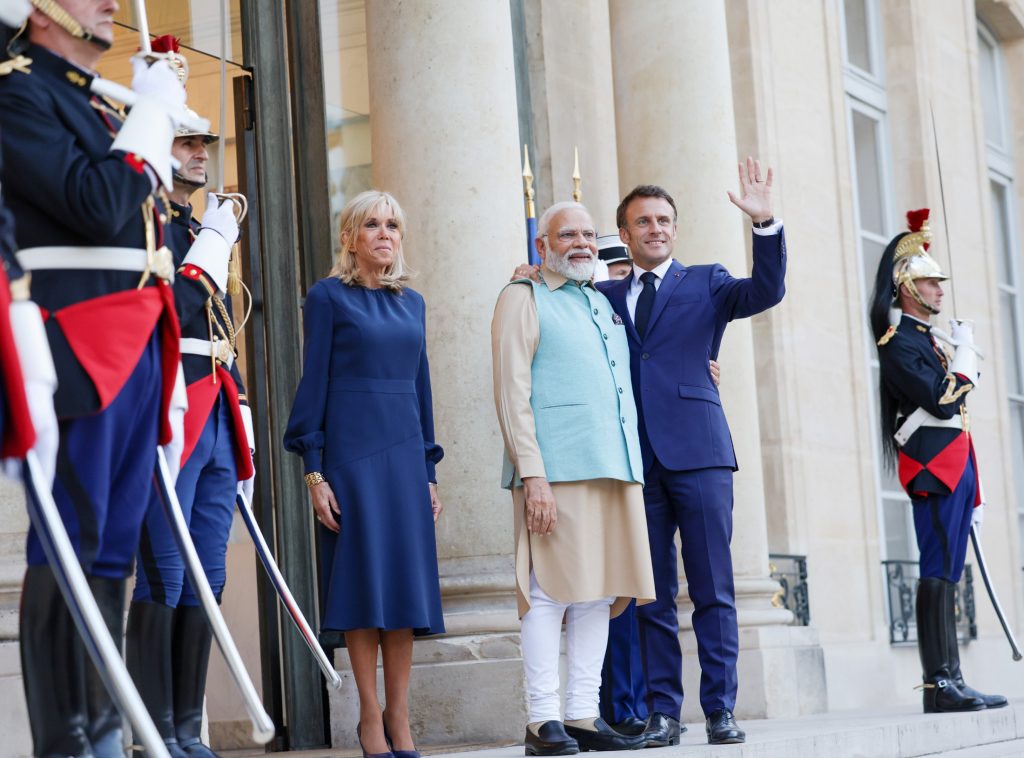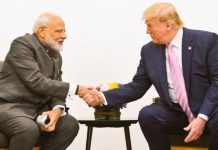
Indian Prime Minister Narendra Modi’s presence as a chief guest at the Batilles or National Day parade in Paris on July 14 marked the celebration of the 25-year old strategic partnership between the two countries
In 1998, India and France re-invented their strategic ties, which could be traced to the reign of Maharaja Ranjit Singh in India’ north-west region comprising present-day Indian as well as Pakistani territories of Punjab. The army of Maharaja Ranjit Singh was trained by French officers. India and France re-invented their close ties by inking a strategic partnership in 1998. It was done within a decade of the collapse of the Soviet Union.
The two countries are now celebrating their 25-year old strategic partnership, when the Indian PM Narendra Modi would be the chief guest at the Batilles or National Day parade in Paris on July 14.
It may be recalled that in 1789, the people of Paris had marched against the cruel administration of their king Louis XVI. The protesters not only had captured weapons from armouries, they had shown extreme courage by joining the protest. In spite of heavy casualties, they had marched to the Royal Fort to get the prisoners released. It has also become an important milestone of the French Revolution; that freedom cannot be compromised, and for this people should be ready to make sacrifices.
It is not known whether Modi would be meeting the descendants of General Jean-Francois Allard, who according to the known details, had joined Maharaja’s army in 1822. It was the period when the socio-economic upheaval was taking place in France.
General Allard had joined Ranjit Singh’s army and played a key-role in training his forces on European pattern. In 2022, this old story of the Indian -French cooperation was recalled at the ancestral city of Allard, Saint Topez, a coastal town, when an Indian minister, Anurag Thakur, visited the city and paid rich tributes to the general. The city’s deputy mayor, Henry Prevost-Allard, a descendant of the general, proposed installation of statues of Maharaja Ranjit Singh and his great grandfather General Allard and his great grandmother, Bannu Pan Dei, a princess of Chamba in Himachal Pradesh in India.
Next Level of Partnership
Modi’s visit to France is taking place when the racial issues have hit France following the riots in July 2023. It is being stated that the killing of a youth by police had triggered off the violence. A large-scale violence has hit the country causing loss to property on an unprecedented scale.
It has caused the apprehension, mostly shared among liberals and proponents of equality and fraternity across the world, that it might negate the social-political achievements made in France during the past two centuries or so as a plural society, under the influence of the French Revolution.
During the 20th century, France was known as a more open society than any European country. It had become the symbol of equality, and fraternity, where no discrimination was allowed to be practiced in the name of religion or faith. The recent country-wide riots, however, have shaken the fundamentals of French polity. The visit of the Indian Prime Minister might enable France to work out a state policy to prevent the rise of rightists in French politics. In other words, it means that the plural character of the French state, a lighthouse for the democratic values worldwide, is under threat. Interestingly, in India, the so-called liberal parties and left outfits accuse Modi of following a pro-Hindutva agenda compromising the secular character of the Indian state, especially following the enactment of the Citizenship Amendment Act and the proposal for UCC or common civil code. The Muslim clerics oppose the UCC, because it empowers a Muslim woman having rights being enjoyed by the women of other communities in India. These religious leaders had forced the then PM Rajiv Gandhi to amend the Constitution to deny a divorced Muslim woman to be regularly paid by her former husband till she gets a job or remarries. The clergies succeeded in getting the country’s basic law amended.
Later, a number of Muslims privately confessed their mistake of opposing the verdict of the Supreme Court in Shah Bano case, which had ultimately led to the Constitutional Amendment.
Interestingly, both Indian and French media are discussing the closer partnership in strategic affairs between the two countries, but the issue of the communal flare-up, which could also be on the agenda, during the visit has not received attention of the media.
It is hoped that France might like to share the Indian experience of tackling radical Islamists for its own survival with its ideals of democracy.
The next level of Indo-French partnership is likely to be on much wider issues than just strategic partnership or defence deals regarding manufacturing in India or the transfer of technology.
Decks cleared for joint ventures
Just a few weeks before Modi’s visit to France, the French outfit, Safran, has announced its decision to set up its facilities at Hyderabad. It may be noted that the facilities for repairing A-320 and Boeing-737 aircrafts have already been set up in Hyderabad. India is also keen for this collaboration. Mainly, because in spite of the country’s defence research outfit, Defence Research Development Organization (DRDO), India could not develop Kaveri jet engines for powering Indian multi-role advanced aircraft (AMCA) projects.
The most exciting deal, which has already been approved by the French President, Emmanuel Macron, is the offer of developing 110 kilo Newton engines to be fully made in India. It is believed that it would not be violating the US legislation regarding International Trade in Arms Regulations. The French offer is considered better than the US-GE-414 engines. It is being stated that the collaboration between the two countries will create a 360-degree capability in India, as the Safran facilities at Hyderabad will enable the two countries to jointly design, develop, test, manufacture and certify new generation aviation engines.
Multilateralism is the essence
One of the veterans in French politics is the country’s foreign minister, Catherine Colonna. She had played a key-role in the country’s strategic ties with India during the tenure of President Jacques Chirac in 1998, and is now hopeful of much intimate cooperation between India and France in a multilateral cooperation. In 1998, she was the spokesperson of the President.
In an interview to an Indian news magazine, she has expressed her satisfaction that the two countries are now poised for intensifying their cooperation for peace and stability. She, however, didn’t mention that the two countries might also be cooperating with each other for their respective social and ethnic stability in their respective countries.
France and India will not only be cooperating with each other for peace and stability in the world, they might soon be sharing their respective experiences in tackling radical Islamist forces.
Both India and France agree to co-operate against international terrorism, like New Zealand, they are opposed to hate speeches.
Assimilation of races
One reason for Indian cooperation with the US could be her capacity to evolve a plural society amidst diversity. In the USA, its 24 per cent population is of immigrants, and now they enrich America. On the other hand, in France, the migrants from Algeria, Arab countries and from the French colonies in Africa have a sizable presence. Among them is also a large number of illegal migrants. These non-whites live in ghettos. Therefore, the recent violence should be studied, especially in the context of the refusal or reluctance of the French to assimilate them in their society. It could also be one of the reasons for their inability to adjust in French society. The French might find the Indian experience useful to them, but for this they have to work genuinely for improving the life of migrants.













